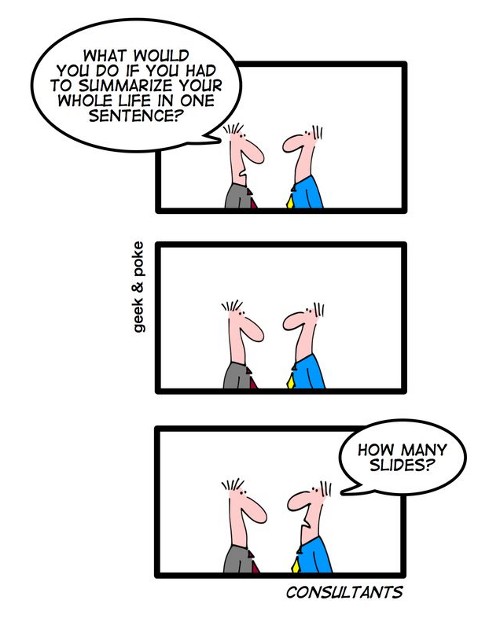After eight and a bit years as a mission consultant, and six years and a bit as a youth ministry consultant, I’m at a crossroads, with decisions to make about the future. Come August 1, I’ll be finished in my current role with the Uniting Church in Australia in Queensland and transitioning into the next phase of my life. One option is to continue in the same field, but elsewhere. Read on for a few of my thoughts on what I would be walking into.

The cartoon is from Geek and Poke, a cartoon series is Oliver Widder, an IT expert based in Hamburg, Germany.
Consulting is mostly, I believe, about listening and looking. I like Fuzz and Carolyn Kitto’s suggestion that consulting is lending people your ears and eyes, not the other way around. It’s about finding clues about what’s happening behind the scenes, under the surface, in the past, present and future. Effective consulting in my line of work requires me to develop an intuitive and thorough understanding of human dynamics, sociology and emotional systems. I’ve learned where to find clues about community trends, looking for hard data (facts and figures) as well as soft data (human stories).
Consulting needs to be empowering. It is tempting to just tell people what to do. “Follow these instructions and you’ll be right”. However I’d rather be coaching local leaders to develop their capacity to discern direction and lead a community into the future. This is “power with” rather than “power over”. I’ve found this complicated when I’ve had the capacity to say yes or no to funding. I do come across ministers whose strengths are in pastoral care and conscientious living, but struggle with how to develop fresh thinking (creativity) and action (innovation). Often, not always, there are people around with drive and creativity who can share in the process. I say “not always”, as people with “get up and go” tend to “get up and go” elsewhere when they’re not given room to move and make things happen.
Consulting involves education as well as listening. Rather than just repeating back what I hear people saying, I look for helpful frameworks that will help people interpret the world they’re living in. I’ve found that creative and sustainable approaches to the future generally come out of a re-examination of assumptions and the exploration of shared language, values and priorities.
A major part of my work has been focused on identifying and developing resources for education and planning. There are some great education resources out there, some of which I covered in my Educating Christians project. However at some point we need to develop more appropriate material. I worked with Graham Beattie on the Faith Stories video project after finding that most equivalent resources finished with a “cross the line” approach to conversion with a narrow substitutionary atonement approach (Four Spiritual Laws or Bridge illustration). I started work on the Mission Stories resource (to be launched in May) after realising that mission planning is more effective when we’ve done some work together on mission paradigms, including how our context has changed, the significance of being a gospel oriented community, the importance of focusing on relational discipleship (not just attendance), community partnership, networking and integrity.
Mission planning doesn’t happen in a day or a weekend. I’ve been using the appreciative inquiry framework for consulting that names four parts of our planning process: discover, dream, design and deliver. Clearly it makes sense to work out what’s already happened and what needs to happen before beginning work with a group of people. Significant questions to ask: “What have you done already?” “What will you do now?” “Who will take this forward?”
